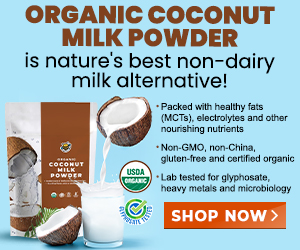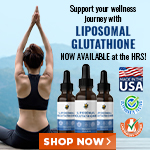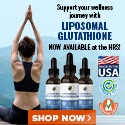
- Newly released JFK files reveal Pentagon's role in creating Lyme disease and covid in the same lab
- The hidden dangers in your kitchen: How cooking methods impact diabetes, cancer and aging
- DEADLY DECEPTION: How COVID vaccines increased mortality rates and why authorities hid the truth
- CDC finally halts $11 billion COVID funding scam as health officials admit the ‘pandemic’ was a fraud
- Arkansas embraces medical freedom with landmark ivermectin law
- Home gardening for preppers: A beginner's guide to growing your own food
- Lab leak confirmed? Boris Johnson's stunning reversal on COVID origins sparks global debate
- GAIN-OF-FUNCTION CAT-BIRD-FLU now on the rise as nearly a dozen cats in Colorado "test positive" for Bird Flu due to contaminated cat food
- Unraveling the paradox: Why intelligent individuals fall prey to everyday blunders
- Cartels shift tactics: Kidnappings and organ trafficking surge as border crossings plummet under Trump policies
- Why you should think twice before buying mainstream toothpaste formulas
- Was JFK's assassination orchestrated by a CIA double agent? New evidence points to James Angleton as the “architect”
- “Rent-a-womb” scandal: How China is exploiting U.S. birthright citizenship for long-term espionage
- Key nodes of Federal Government censorship
- Trump's greatest betrayal so far: Accelerating Middle East wars, silencing dissent, and serving Zionist masters
- ATTENTION PRESIDENT TRUMP: Please WITHDRAW your nomination of Dr. Susan Monarez for CDC Director as she is a VAX FANATIC and TOXIC JAB ZEALOT
- Record honeybee deaths devastate U.S. agriculture, pesticides under scrutiny
- Speaker Johnson warns Congress may defund or disband rogue courts targeting Trump
- Newly released JFK files reveal Pentagon's role in creating Lyme disease and covid in the same lab
- Elon Musk: Aliens could be here on Earth RIGHT NOW
- Festive flavors: The sweet history, nutritional profile and health benefits of pecan pie
- Trump reverses course on Gaza plan, says “nobody is expelling Palestinians”
- Reclaim your health: How midlife exercise reverses years of inactivity
- Big Pharma's $8 Billion bribery scheme exposed: how doctors are pushed to prescribe junk science, not heal
- Boys are back in town: Trump’s patriotic alpha crew takes the wheel while toxic females ride in the backseat
- EPA advisor admits the agency is funneling billions to climate groups ahead of Trump’s return to White House
- Space war brewing? Russia threatens to destroy Starlink satellites
- Survival 101: Effective EMF blocking techniques
- A lack of integrity in Academia: Harvard professor found GUILTY of fraudulent research to promote CRT theory
- Mike Adams Sermon 66: God will DESTROY ISRAEL for its wickedness
- 5 Simple steps to boost your brainpower: How to strengthen executive function in a distracted world
- Rep. Nancy Mace introduces bill to ban biological males from female facilities on federal property
- Sugarcane extract superior to cholesterol-lowering drugs?
- WHO focusing more on policing speech about public health and implementing global surveillance systems
- Pilots report mysterious lights 'moving at extreme speeds' across Oregon skies
- Dr. Mike Yeadon releases 15-minute testimony - WATCH - about genocidal intent of COVID “vaccines”
- EPA advisor admits the agency is funneling billions to climate groups ahead of Trump’s return to White House
- The Health Ranger releases “Vaccine Zombie” song and music video, using AI-animated zombies for the music video
- California's social media censorship law struck down: A victory for free speech or a threat to online safety?
- Dr. Mike Yeadon releases 15-minute testimony - WATCH - about genocidal intent of COVID “vaccines”
- The pandemic as a tool for INDOCTRINATION: Understanding “The Indoctrinated Brain” by Dr. Michael Nehls
- Florida takes a stand: DeSantis proposes permanent ban on mRNA vaccine mandates
- Mike Adams releases country western hit single: Goin’ Back in Time is Comin’ Home
- Mike Adams releases music poetry sensation: A Child of God
- “Why we influenced the 2020 elections”: Facebook files reveal the coordinated effort to bury the Hunter Biden laptop story
- RFK Jr. clears key hurdle: Sen. Susan Collins backs controversial HHS nominee, signaling a new era for health policy
- Unpacking the Lies That We’ve Been Fed – new song and music video released by Mike Adams, the Health Ranger
- Mike Adams releases new song and music video: Nothing More Disgusting Than a Globalist
- Newly released JFK files reveal Pentagon's role in creating Lyme disease and covid in the same lab
- Congratulations to the FULLY UNVACCINATED as you resisted the COVID-19 PROPAGANDA MACHINE fueled by over $100 BILLION
- Michigan sheriff announces criminal investigation into 2020 election crimes, Dominion Voting Systems
- Israeli soldiers accused of even more torture and abuse in the West Bank
- Migrants are taking advantage of recent hurricanes to scam residents and loot their homes
- House Intelligence Committee calls for the ARREST and PROSECUTION of Dr. Anthony Fauci
- Red Cross issues warning to stop blood plasma donations from vaccinated people
- Scientists confirm: GENIUS brain function can be spontaneously unleashed in humans without any apparent cause
- EPA advisor admits the agency is funneling billions to climate groups ahead of Trump’s return to White House
- HYSSOP: What research reveals about the health benefits of this ancient holy herb
- Two containers with completed ballots fall out of truck in Florida
- Fully vaccinated about to see “tsunami” of illness and death, warns virologist
- Global leaders unite to clamp down on “misinformation” with UN-backed Cascais Declaration
- BREAKING: 2025 NDAA authorizes mandatory military draft of WOMEN across America… as Pentagon pursues global NUCLEAR war with both Russia and China at the same time
- Michael Yon warns of a ZIONIST TAKEOVER in Trump’s second administration
- BOMBSHELL: DNA testing kits are a SCAM to develop ethnic-specific bioweapons
- Ozempic and Wegovy weight loss drugs are injectable LIZARD VENOM PEPTIDES that may unleash a devastating wave of organ failure… side effects align with symptoms of SNAKE BITES
- Israeli soldiers accused of even more torture and abuse in the West Bank
- These 13 countries just signed an agreement to engineer a global FAMINE by destroying food supply
- NASA admits that climate change occurs because of changes in Earth’s solar orbit, and NOT because of SUVs and fossil fuels
- RFK Jr. clears key hurdle: Sen. Susan Collins backs controversial HHS nominee, signaling a new era for health policy
- Sermon 30: How Jesus reveals Caesar’s FAKE CURRENCY and FALSE AUTHORITY
- Coriander seeds: Ancient medicine backed by modern science
- Arizona officials claim Maricopa County needs 10-13 days to tabulate results of the election
In the 15 years of study, researchers found out that dietary aluminum from water sources could be a risk factor for developing dementia. They also found a helpful solution. They found that the mineral silica could help decrease the risk of aluminum-induced dementia in elderly patients.
A 2009 report from the American Journal of Epidemiology details this 15-year study from France. The study followed the lives of 1,925 elderly patients between the years 1988 and 2003. All of the elderly men and women were selected from 91 different municipalities with different water sources in southern France. Their aluminum intake levels were studied, from water and other sources, as the researchers investigated the metal's role in bringing about dementia throughout the 15-year period. During that time, the researchers also investigated the impact of silica in reducing participants' risk of dementia.
Aluminum from drinking water increased dementia in 15-year study
Of the nearly 2,000 elderly studied, none showed any signs of dementia beginning in 1988.The researchers ruled out environmental aluminum intake factors during the study and focused solely on aluminum intake from water. The participants' daily consumption of tap and bottled water was recorded. Reliable water assessment data was analyzed. In the study, aluminum consumption greater than or equal to 0.1 mg per day from drinking water was correlated with declining cognitive ability. Over the years, the accumulation of aluminum inflicted negative mental effects, welcoming dementia in what was once a mentally healthy group of elderly adults. Using the scientific Cox model, the researchers found that highest exposure to aluminum may be a risk factor for full-blown dementia.
Hoping to the help the participants, the researchers looked further and assessed silica intake for its ability to reduce dementia.
What they discovered was that when participants increased their silica intake by 10 mg/day, incidences of dementia subsided. The change was drastic.
This discovery coincides with the expert analysis of Dr. Chris Exley, PhD.
Doctor recommends silica to help those affected by aluminum from vaccines
At a January 2011 vaccine safety conference in Jamaica, Dr. Exley talked about ways to reduce the toxic effects of aluminum in the body. He talked about the importance of silica and mentioned two brands of silica-enhanced water, Volvic and Spritzer. After conducting several urine tests, Exley and his team of researchers proved that high-silica mineral waters help remove aluminum from the body. In a presentation involving victims of Gardasil's adverse reactions, Exley showed how silica improved the damages caused by aluminum-laced vaccines. Based off 20 years of study, Dr. Exley recommends drinking a liter of silica-rich water daily to reduce the burden of accumulated aluminum in the body.Sources of silica
Thankfully, silica mineral water isn't the only place to obtain this important mineral.
According to the 1993 book Silica: The Forgotten Nutrient, by Klaus Kaufmann, silica can be found primarily in the following foods (Silica content is measured in mg.):
- Oats: 595
- Millet: 500
- Barley: 233
- Potatoes: 200
- Whole wheat grain: 158
- Jersusalem artichoke: 36
- Red beets: 21
- Corn: 19
- Asparagus: 18
- Rye: 17
One of the sources of silica not mentioned above is horsetail. Respected as a strong diuretic and astringent herb, horsetail is a fern-like, nonflowering weed that is loaded with silica. The tall, hollow stems resemble asparagus and often grow in bunches. When the plant begins to dry, silica crystals form in the stems and appear to look like feathery tails. This herb can be purchased as a dry powder and can be used raw to make tinctures. The silica content of horsetail is unmatched and is famous for helping people grow healthy hair, nails and skin.
With its high silica content, horsetail may also be good for removing aluminum from the body and warding off dementia.
Sources for this article include:
http://science.naturalnews.com
http://www.naturalnews.com
Silica: The Forgotten Nutrient by Klaus Kaufmann (alive Books, 1993).
http://umm.edu
Aluminum at FETCH.news
Get independent news alerts on natural cures, food lab tests, cannabis medicine, science, robotics, drones, privacy and more.
Take Action: Support Natural News by linking to this article from your website
Permalink to this article:
Embed article link: (copy HTML code below):
Reprinting this article:
Non-commercial use OK, cite NaturalNews.com with clickable link.
Follow Natural News on Facebook, Twitter, Google Plus, and Pinterest
Science News & Studies
Medicine News and Information
Food News & Studies
Health News & Studies
Herbs News & Information
Pollution News & Studies
Cancer News & Studies
Climate News & Studies
Survival News & Information
Gear News & Information
News covering technology, stocks, hackers, and more



"Big Tech and mainstream media are constantly trying to silence the independent voices that dare to bring you the truth about toxic food ingredients, dangerous medications and the failed, fraudulent science of the profit-driven medical establishment.
Email is one of the best ways to make sure you stay informed, without the censorship of the tech giants (Google, Apple, Facebook, Twitter, YouTube, etc.). Stay informed and you'll even likely learn information that may help save your own life."
–The Health Ranger, Mike Adams













































